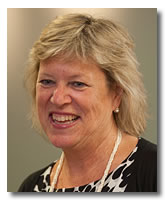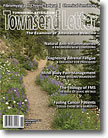|
Hospitals are seeing sicker patients than they did a decade ago, for shorter stays. "We are seeing patients with complex conditions, multiorgan diseases. At the same time, the average length of stay nowadays is about three and a half days," said Cindy Reilly, RN, BSN, vice president of quality and patient safety at Marlborough Hospital (Marlborough, Massachusetts). "The patient comes in; they're in crisis. The next day they're being treated and stabilized. The third day they go home. We need to do a lot of teaching during those three days."
 Marlborough has made changes in its standard processes to ensure that patients receive appropriate care in the hospital, and go home with the information that they need. For example, nurses now practice "intentional rounding." This means that they go into the room, pull up a chair, make eye contact with patients, and ask how they are doing and what they need. "Sometimes you just do 'howdy rounds,'" Reilly said. "You stick your head in, and say, 'How ya doing?' The person says, 'I'm OK,' and you go on to your next patient. But it is important to schedule some visits throughout the day, when you ask patients what they need, in a way that signals you have plenty of time to listen to their answers." Marlborough has made changes in its standard processes to ensure that patients receive appropriate care in the hospital, and go home with the information that they need. For example, nurses now practice "intentional rounding." This means that they go into the room, pull up a chair, make eye contact with patients, and ask how they are doing and what they need. "Sometimes you just do 'howdy rounds,'" Reilly said. "You stick your head in, and say, 'How ya doing?' The person says, 'I'm OK,' and you go on to your next patient. But it is important to schedule some visits throughout the day, when you ask patients what they need, in a way that signals you have plenty of time to listen to their answers."
The hospital puts whiteboards in each patient's room to inform the patient about care team members and what is planned for the day. The whiteboard also serves as a place to note questions from family members. The hospital uses printed "progress cards" with red, yellow, and green arrows to show where patients are in their healing process and readiness for discharge. In addition, Marlborough practices "multidisciplinary team rounds" in which the physician, nurse, pharmacist, case manager, physical therapist, and dietitian meet together to discuss the individual patient's plan of care. "Actually, this is all so basic," Reilly said. "One of the changes we most need to make in health care is to stop thinking about doing things for the patient, or to the patient. Instead, we need to think of delivering health care with the patient."
In the Hospital, Ask Questions
In addition to making changes in hospital procedures, Reilly has a special concern to make sure that patients themselves understand the steps they can take while in the hospital, and after they leave the hospital, so they have the tools they need to care for themselves.
Every patient should leave the hospital with a discharge plan of care. It should include information about current medications, since medications are often changed during a hospital stay. It should include information on dietary restrictions and limitations on activities, and scheduled follow-up appointments with primary care physicians and specialists. Every patient needs to understand the warning signs of potential trouble, and whom to call if those signs are present.
"Ask questions," Reilly said. "Continue to ask questions until you completely understand everything you need to know about your own plan of care." For example, if you're taking medications, it's fine to ask about the dosage and schedule, so you can take them at a time that fits your lifestyle. If you need follow-up appointments, they should be scheduled at a time when a family member can come with you, or when someone is available to care for children at home. If transportation to health-care appointments is an issue, hospital case managers often can suggest ways to meet this need.
A recent study in the journal Health Affairs found that many people hesitate before asking their doctors questions, because they fear they may get a reputation as a "difficult person." Reilly understands that being in the hospital is an unfamiliar, scary experience. "But having to return to a hospital for the same or a similar problem within a short period of time probably feels even worse!" she said. "Do ask questions until you fully understand what you need to do when you get home. Becoming an active participant in your own plan of care is key to your recovery."
Inevitably, many of the clinicians who treat patients in the hospital are busy. They have many patients, and they deal with crises first. "The practitioner may understand what they are doing for the patient, and why they are doing it, but they do not always take the time to articulate this clearly for patients," Reilly said. "That is why you the patient should have a notepad in your hand. Consider yourself empowered to engage in the process of care, because the more you understand, the better you will be able to promote your own health when you are back at home."
Hospital Nurse Advocates for Primary Care
In addition to educating patients about the questions that they should ask their providers, Reilly also encourages health-care practitioners to take full advantage of listening opportunities and teaching opportunities when they are with patients. "One important step is to encourage patients to have annual physicals," she said. "It provides an opportunity to have these important conversations when the patient is not in crisis. In addition, regular preventive testing and monitoring of chronic conditions can prevent serious side effects. Diabetics need to be checked to make sure that they have sufficient blood flow to their extremities; they need regular eye exams to prevent serious damage to their eyes."
Primary-care practitioners have an essential opportunity to discuss the patient's condition in an open-ended way, she said. As a hospital nurse, Reilly often sees patients who end up in the emergency room, or back as inpatients, because they did not fully understand their condition. For example, congestive heart failure is one of the most common causes of readmission to the hospital soon after discharge. When someone has congestive heart failure, it's very important to limit salt intake. "Since canned foods are high in salt, you may say to a patient, 'Don't eat canned food,' as a kind of shorthand," she said. "But we find patients often don't understand that this includes preserved meats such as Spam, and the salty soups at the supermarket hot bar. Taking enough time to explain why it is so important to limit salt intake, and how to read the labels on food, plays such an important role in helping patients to understand their own care, and stay healthy."
Resources
The Patient-Centered Care Institute has a detailed guide on ways to improve communications with patients: http://www.patient-centeredcare.org/inside/abouttheguide.html.
Frosch DL, May SG, Rendle KAS, Tietbohl C, Elwyn G. Authoritarian physicians and patients' fear of being labeled 'difficult' among key obstacles to shared decision making. Health Aff. May 2012;31(5):1030–1038.
Reilly Also Recommends
Johnson B, Abraham M, Conway J, et al. Partnering with patients and families to design patient-and-family-centered health care system [online document]. Institute for Patient- and Family-Centered Care. 2008. Available at http://www.ipfcc.org/tools/downloads.html.
Ponte PR, Conlin G, Conway JB, et al. Making patient-centered care come alive: Achieving full integration of the patient's perspective. J Nurs Admin. 2003;33(2):82–90.
Elaine Zablocki has been a freelance health-care journalist for more than 20 years. She was the editor of Alternative Medicine Business News and CHRF News Files. She writes regularly for many health-care publications.
|
![]()
![]()
![]()





 Marlborough has made changes in its standard processes to ensure that patients receive appropriate care in the hospital, and go home with the information that they need. For example, nurses now practice "intentional rounding." This means that they go into the room, pull up a chair, make eye contact with patients, and ask how they are doing and what they need. "Sometimes you just do 'howdy rounds,'" Reilly said. "You stick your head in, and say, 'How ya doing?' The person says, 'I'm OK,' and you go on to your next patient. But it is important to schedule some visits throughout the day, when you ask patients what they need, in a way that signals you have plenty of time to listen to their answers."
Marlborough has made changes in its standard processes to ensure that patients receive appropriate care in the hospital, and go home with the information that they need. For example, nurses now practice "intentional rounding." This means that they go into the room, pull up a chair, make eye contact with patients, and ask how they are doing and what they need. "Sometimes you just do 'howdy rounds,'" Reilly said. "You stick your head in, and say, 'How ya doing?' The person says, 'I'm OK,' and you go on to your next patient. But it is important to schedule some visits throughout the day, when you ask patients what they need, in a way that signals you have plenty of time to listen to their answers."